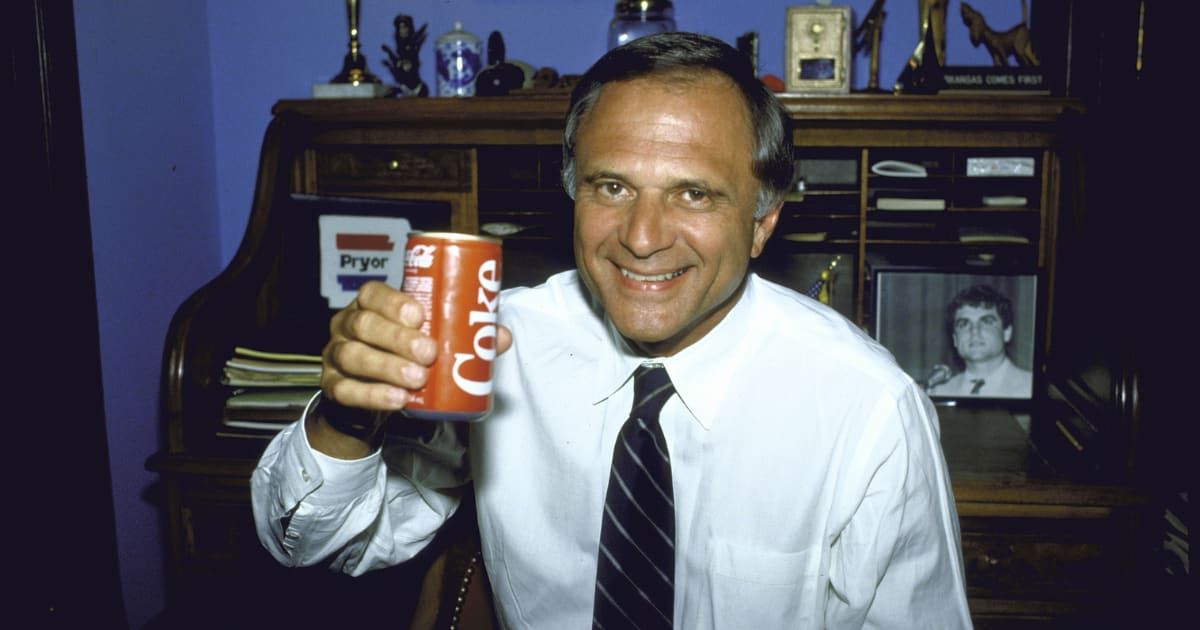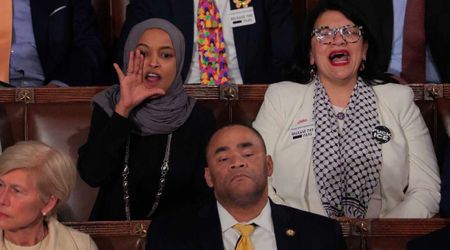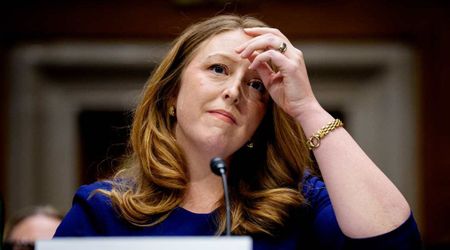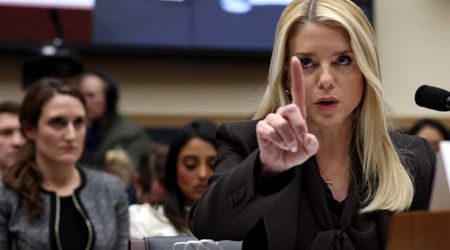'A true gentleman': Tributes pour in as beloved Arkansas statesman David Pryor dies at 89

LITTLE ROCK, ARKANSAS: David Pryor, former governor and senator of Arkansas, died on Saturday, April 20, at the age of 89.
The politician, who was revered for his dedication to public service and his commitment to progressive policies, died at his Little Rock home, surrounded by his family.
Family and fellow lawmakers remember David Pryor
Mark Pryor, David Pryor's son and a former senator, fondly remembered his father as a paragon of public service, stating, "I think he was a great model for public service...how we should treat each other and how we can make Arkansas better."
Pryor's legacy looms large in Arkansas politics, earning him a place alongside luminaries like former President Bill Clinton and the late Senator Dale Bumpers.
In addition to serving as the 39th governor of Arkansas from 1975 to 1979, he was a member of the Arkansas House of Representatives from 1960 to 1966.
Clinton paid tribute to Pryor, describing him as "one of Arkansas’ greatest servant leaders" and lauding his efforts in advancing progressive policies that united the state.
"David made politics personal — from his famed retail campaigning to his ability to calmly and confidently explain tough votes to his constituents," said Clinton, adding, "He was honest, compassionate, and full of common sense. He really loved the people he represented, and they loved him back."
My statement on the passing of my friend David Pryor. pic.twitter.com/N7EwlXRznz
— Bill Clinton (@BillClinton) April 20, 2024
Mike Beebe, another former Arkansas governor and close friend of Pryor, praised his honesty, pragmatism, and deep understanding of the issues facing Arkansas.
In a statement, he noted, "His personal style of homespun humor, quick wit, and genuine warmth, combined with his deep knowledge, gave him the ability to pass progressive legislation that was so beneficial to our state."
"His top priorities of Arkansas Comes First and focusing on the problems of our aging population and taxpayer reform made him beloved by his colleagues and his constituents," expressed Beebe.
David Pryor hailed as a 'true gentleman and statesman'
Pryor's impact transcended party lines, drawing accolades from both Democrats and Republicans.
Governor Sarah Huckabee Sanders recognized his charisma and moderate politics.
Taking to X (formerly Twitter), Sanders wrote, "While the Senator and I came up in different political parties, I, like all Arkansans deeply appreciated his diligent stewardship of Arkansas and our interests during his time in public life. And We can all thank him for his role in burying the divisive racial politics that infected Arkansas government before his tenure."
Asa Hutchinson hailed him as "the quintessential public servant," and added, "He gave up other opportunities to serve Arkansas throughout his life and the public debate was elevated because of his service."
Republican Senator Tom Cotton echoed similar sentiments, describing Pryor as "a true gentleman and a statesman who dedicated more than a half century of his life to the service of our state and nation."
Cotton noted that Pryor's example has served and will continue to serve as an inspiration for Arkansans.
Former Alabama Sen Doug Jones expressed, "For the second time in a week we have lost another great statesman and one of my 'New South' heroes, former Arkansas governor and U.S Senator David Pryor. As a young newspaper editor, he challenged the racist ways of Gov. Faubus and later became one of Arkansas’s great reformers. His influence will be felt for generations."
My statement on the passing of former U.S. Congressman, Arkansas Governor, and U.S. Senator David Pryor:
— Sarah Huckabee Sanders (@SarahHuckabee) April 20, 2024
“Bryan and I are mourning the death of a dedicated Congressman, Governor, and Senator, David Pryor. His career defied easy definition: a man with deep roots in Ouachita… pic.twitter.com/u8sIypwZk1
David Pryor was the quintessential public servant. He gave up other opportunities to serve Arkansas throughout his life and the public debate was elevated because of his service. Our prayers are with Barbara and the Pryor family. https://t.co/aj5RheTHCR
— Gov. Asa Hutchinson (@AsaHutchinson) April 20, 2024
David Pryor was a true gentleman and a statesman who dedicated more than a half century of his life to the service of our state and nation. pic.twitter.com/xnI2lrO9Mh
— Tom Cotton (@SenTomCotton) April 20, 2024
For the second time in a week we have lost another great statesman and one of my “New South” heros, former Arkansas governor and U.S Senator David Pryor. As a young newspaper editor he challenged the racist ways of Gov. Faubus and later became one of Arkansas’s great reformers.… pic.twitter.com/Ky6nf1LsQV
— Doug Jones (@DougJones) April 20, 2024
David Pryor's stellar political career
Pryor began his journey in politics in 1960 when he was elected to the Arkansas House, where he served until 1966. During this time, he gained a reputation as one of the "Young Turks," advocating for reform within the state's political system.
Despite encountering obstacles, he remained steadfast in his commitment to effecting change. "I guess I was a young reformer at the moment," said Pryor in 2006, adding, "I was going to change the world. I wanted it to change overnight, but it didn’t."
In 1972, Pryor experienced his first, and only, political defeat when he challenged Sen John McClellan's bid for a sixth term in the Democratic primary. Although he forced a runoff with McClellan, Pryor ultimately lost by about 18,000 votes.
The defeat left a lasting impact on Pryor, leading him to briefly withdraw from politics before resuming his journey.
In his 2008 autobiography, 'A Pryor Commitment', he wrote, "Following the McClellan race, I abandoned politics, or politics abandoned me. I didn’t care who was governor or president. I avoided reading the paper for months on end. I just wanted to be left alone and, like General MacArthur, silently fade away."
Elected governor in 1974, succeeding Dale Bumpers, Pryor served four years before transitioning to the Senate.
During his tenure in Congress, Pryor championed numerous initiatives, including the passage of a Taxpayer's Bill of Rights in 1988, which expanded citizens' rights when dealing with the IRS. He viewed this legislation as the cornerstone of his congressional career, emphasizing its importance in protecting the average taxpayer.
He asserted, "I didn’t sponsor this bill to help Donald Trump or Lee Iacocca. This is a bill that protects the average taxpayer."
Pryor's dedication to public service extended beyond legislative accomplishments. He focused on helping the elderly and conducted undercover investigations into nursing homes during his time in the House.
He wrote, "Even now, I recall clearly the loneliness, neglect, despair, anxiety, and boredom — in particular the boredom — of those cold and sterile homes. Essentially human warehouses for old people.”
After deciding not to seek reelection in 1996, Pryor retired from elective office in early 1997. However, he remained actively involved in public life, serving as the inaugural dean of the University of Arkansas Clinton School of Public Service and temporarily chairing the state Democratic Party in 2008.
On the University of Arkansas' Board of Trustees, Pryor continued to advocate for principled positions, including his opposition to a $160 million plan to expand Donald W Reynolds Razorback Stadium in 2016. He remained a vocal critic of what he termed the "nuclear arms race" among college football programs.
Pryor is survived by his wife, Barbara, and their three children, as per the Associated Press.
This article contains remarks made on the Internet by individual people and organizations. MEAWW cannot confirm them independently and does not support claims or opinions being made online.










